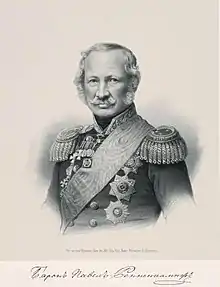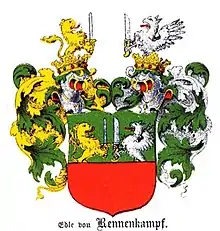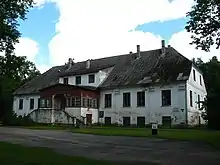Paul Andreas von Rennenkampff
Paul Andreas Edler[lower-alpha 1] von Rennenkampff[lower-alpha 2] (Russian: Па́вел Я́ковлевич Ренненка́мпф, tr. Pável Yákovlevich Rennenkámpf; 9 March [O.S. 26 February] 1790 – 8 December [O.S. 26 November] 1857 or 26 December [O.S. 14] 1857) was a Baltic German nobleman, military commander and Statesman in the service of the Imperial Russian Army. Rennenkampff was noted for his distinguished roles during the Suppression of the South Ossetians in 1830 and the Crimean War, especially during the Siege of Sevastopol.
Paul Andreas von Rennenkampff | |
|---|---|
 Lieutenant-General Paul Andreas Edler von Rennenkampff, c. 1855. | |
| Born | 9 March [O.S. 26 February] 1790 Helmet Manor, Helmet, Kreis Fellin, Governorate of Livonia, Russian Empire (in present-day Helme, Valga County, Estonia) |
| Died | 8 December [O.S. 26 November] 1857 or 26 December [O.S. 14] 1857 (aged 67) St. Petersburg, Russian Empire |
| Buried | |
| Allegiance | |
| Service/ | |
| Years of service | 1812-1846 1849-1857 |
| Rank | |
| Commands held | 1st Infantry Division 19th Infantry Division[1] |
| Battles/wars | Napoleonic Wars
South Ossetian Expedition of 1830 |
| Children | 1 child (debated) |


Biography
Origin
Paul Andreas Edler von Rennenkampff was born on 9 March [O.S. 26 February] 1790 in the Helme Manor (German: Schloss Helmet) at Helmet in the Governorate of Livonia (present-day Helme, Estonia), to Jakob Johann von Rennenkampff and Elizabeth Dorothea von Anrep. The Rennenkampffs was of Westphalian origin and was originated in Osnabrück. He was the great-uncle[4][5] of the famed World War I general Paul von Rennenkampf.
Family
As part of a wealthy noble family, Rennenkampff had a lot of siblings, including his older brothers Karl Jakob Alexander von Rennenkampff (1783-1854), a writer, captain and chamberlain in Holstein-Oldenburg, and Gustav Reinhold Georg (1784-1869), an army officer in Saxe-Coburg-Saalfeld, politician and economist. In 1832, Rennenkampff married Anna Maria von Vegesack (1808-1881), they had one child, Johann Paul Alexander von Rennenkampff (1836-1838). Although some sources claimed that Rennenkampff had another child named Nikolaus Jakob Otto von Rennenkampff, but that was never confirmed. But either way, even if both children existed, neither of them survived through childhood.[5]
Honours and awards
Domestic
 Order of St. Anna, 4th class (1813)
Order of St. Anna, 4th class (1813) Golden sword with the inscription "For Bravery"
Golden sword with the inscription "For Bravery" Order of St. Anna, 1st class with imperial crown (1.1.1831, imperial crown on (14.10.1831)
Order of St. Anna, 1st class with imperial crown (1.1.1831, imperial crown on (14.10.1831) Order of St. George, 4th class "For 25 years of service" (1831)
Order of St. George, 4th class "For 25 years of service" (1831) Order of St. Vladimir, 2nd class (14.3.1842)
Order of St. Vladimir, 2nd class (14.3.1842) Order of the White Eagle with swords (1855)
Order of the White Eagle with swords (1855)
Foreign
.svg.png.webp) Kingdom of Prussia:
Kingdom of Prussia:
 Pour le Mérite (1814)
Pour le Mérite (1814) Order of the Red Eagle, 2nd class with a star (1835)
Order of the Red Eagle, 2nd class with a star (1835)
.svg.png.webp) French Third Republic:
French Third Republic:
 Legion of Honour, Knight class (1814)
Legion of Honour, Knight class (1814)
.svg.png.webp) Qajar dynasty:
Qajar dynasty:
._Medal.gif) Order of the Lion and the Sun, 1st class (1828)
Order of the Lion and the Sun, 1st class (1828)
 Austrian Empire:
Austrian Empire:
 Order of the Iron Crown, 1st class (1835)
Order of the Iron Crown, 1st class (1835)
 Kingdom of Denmark:
Kingdom of Denmark:
 Order of Dannebrog, Grand Commander class (1836)[6]
Order of Dannebrog, Grand Commander class (1836)[6]
Notes
References
- RBS/BT/Rennenkampf, Pavel Yakovlevich
- Klingspor 1882, pp. 90.
- Transehe-Roseneck 1929, p. 776-779.
- Stackelberg 1930, pp. 205.
- Transehe-Roseneck 1929, p. 782.
- List of senior generals. Corrected on January 7, 1856. - SPb .: Military Printing House, 1856. pp. 275-276
Works cited
- Rennenkampf, Pavel Yakovlevich (Paul Andreas Edler von Rennenkampff) (1790-1857)
- Klingspor, Carl Arvid (1882). Baltic heraldic coat of arms all, belonging to the knighthoods of Livonia, Estonia, Courland and Oesel noble families. Stockholm].
{{cite book}}: CS1 maint: location missing publisher (link) - Stackelberg, Otto Magnus von (1930). Genealogische Handbuch der baltischen Ritterschaften. Teil Estland, Band I (in German). Starke Verlag, Görlitz. pp. 422–439. Retrieved 4 April 2019.
- Transehe-Roseneck, Astaf von (1929). Genealogisches Handbuch der baltischen Ritterschaften [Genealogical Handbook of the Baltic Knighthoods] (in German). Vol. Part 1, 2: Livonia, Lfg. 9-15. Görlitz.
{{cite book}}: CS1 maint: location missing publisher (link) - Welding, Olaf (1970). Baltic German Biographical Dictionary 1710-1960.